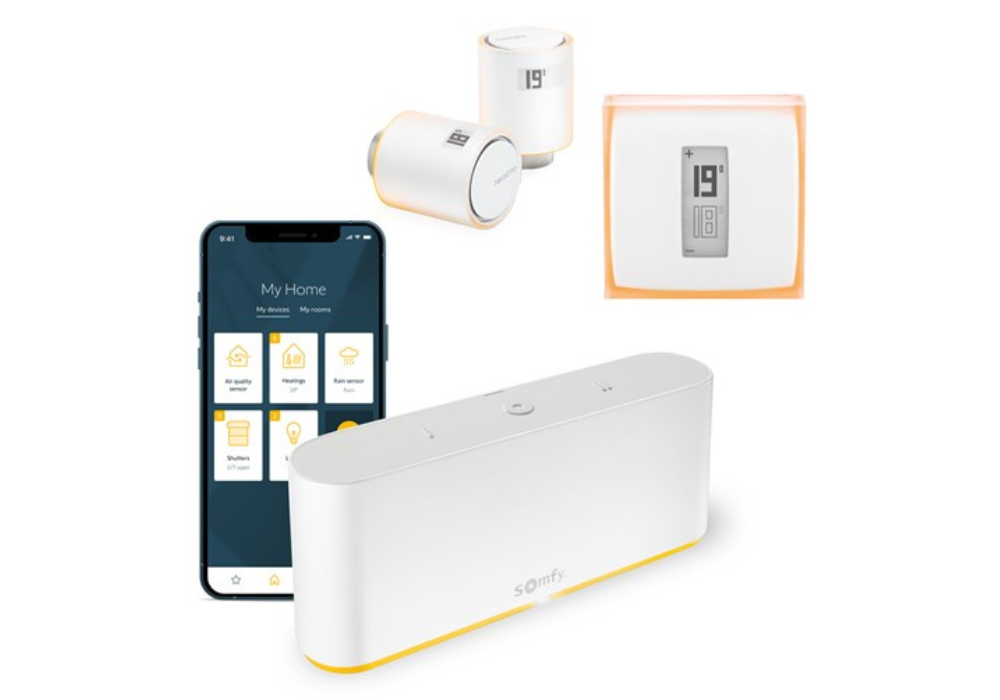
Inteligentny Termostat i Głowice Termostatyczne marki Netatmo kompatybilne z centralą TaHoma switch od Somfy

So, we know that presence sensors, or motion sensors, are an integral key component of motion detection devices. These presence sensors/motion sensors are the component that allows these motion detectors to detect unusual movement within your home.
Infrared detection is the technology at the centre of how these devices function. Presence sensors/motion sensors actually detect the infrared radiation emanating from people around your home.
These components are usually referred to as infrared sensors, or Passive InfraRed (PIR) sensors. So, while you’re browsing potential presence sensors to install in your home, keep an eye out for these product specifications.
Before we take a closer look at the function of presence sensors/motion sensors in general, we’ll discuss these integral Passive InfraRed sensors in a little more detail.
Passive InfraRed sensors pick up on the infrared radiation that warm objects constantly emit. In the context of home security, Passive InfraRed sensors are so useful as they can detect infrared radiation that is continually released from human bodies.
So, all devices that include Passive InfraRed sensors are able to pick up on suspicious movements around your home. Then, depending on the security products or devices that you’ve got set up around your home, your presence sensors can trigger security lighting functions, a loud security alarm, or video surveillance cameras.
Overall, motion sensors/presence sensors work based on two distinct phases:
1) The built-in presence sensors that are incorporated into your motion detector pick up on a presence within the area they’re monitoring.
2) Then, the motion detector triggers the secondary tier of your home security set-up, allowing security cameras, alarms and lighting to kick in. Interconnect your devices to gain total control over your home security system.
Often, home security product pages will refer to “motion detectors” as the whole product, but the terms “presence sensor” or “motion sensor” refer more to the actual motion detection technology within the detector device.
Without the sensor component, a motion detector would really just be a plastic box – a (possibly convincing) dummy!
You’ll always find presence sensors/motion sensors within motion detection products, but you’ll also find these devices in other home security products.
Surveillance cameras themselves, for example, might include presence sensors/motion sensors so that they can trigger your home security alarms, or send you a home security alert to your connected smart devices.
Smart home security devices will give you total control over triggering and turning off any of your home security products, even while you’re away from the property.
For example, if you install smart surveillance cameras that include presence sensors/motion sensors, these could be able to stream you live images of the suspicious motion they’re detecting. Then, you can choose whether to trigger your home security system to deter an intruder.
So, these motion sensing and detection functions are a key asset to setting up effective home security, especially if you’re looking into smart and wireless systems.
Now, we’ve seen that infrared motion detection technology is some of the most widespread on the home security market, but there are other options out there, too.
Ultrasonic motion sensors are even more sensitive than their infrared counterparts. So, they could be the best option for you, depending on your security aims and how you’ll be installing your products or devices.
We’ve looked into the actual detection technology, as well as its specific applications for home security – whether that’s in standalone motion detection and alarm systems, or integrated into a wider smart home security set-up.
Infrared and motion detection technology have far wider potential applications in your home and workplace, too:
We’ve covered this in some detail – you’re the experts now! If you’re looking to increase your control as a home owner of your property’s security, speak to Netatmo today. We can advise on setting up presence sensors/motion sensors and integrating motion detection technology into an existing home security system (smart or not, wireless or wired).
Looking into installing motion detection technology in places other than your home? Presence sensors or motion sensors can be a great addition to a security system for a company, warehouse or commercial premises.
With the right motion detection technology set up, you’ll have the capacity to detect unwanted movements and unwanted objects being kept in storage, too.
Use motion detection devices to minimise the time your home’s lights are on. Set up presence sensors/motion sensors in strategic locations and your lighting will only go on when people moving around your home trigger the need for it.
That way, your lighting will automatically shut itself off when it’s not required, saving you money on your electricity bills and saving the environment, too. Of course, the same goes for added control over lighting in storage, corporate and commercial sites too.
Similarly, you can use presence sensors/motion sensors to automatically open any doors, gates, garage doors, windows, shutters, etc. around your home or professional premises.
Why not save time and make these processes much more convenient with top of the range motion detection technology?
This is likely to be a role of presence sensors/motion sensors that you’re familiar with, but that you’ve never given much thought to before.
Well, hands-free toilet flushes and basin taps use the same infrared radiation detection to pick up on the hand you wave to activate these functions. Nifty, right?
These devices already feature in your day to day! These types of hands-free toilet flush and basin tap functions can work well to increase the general levels of hygiene in shared bathroom facilities.

Włamanie
Wireless motion sensors: how can you integrate these security products into your home?

Włamanie
Presence detectors: which product model is best for your security set-up?

Włamanie
Motion sensors: what use are these devices as part of your home security?

Włamanie
Infrared sensors: why are they such vital products in an effective home security system?